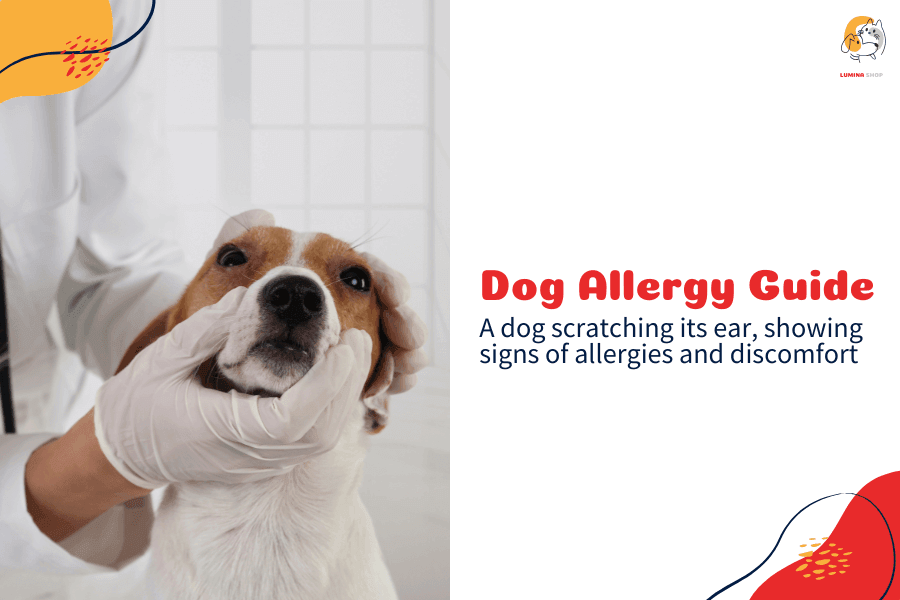
What Is the Biggest Cause of Allergies in Dogs?
Allergies in dogs are more common than many pet owners realize. From itchy skin and ear infections to digestive problems and respiratory issues, allergies can affect your dog’s comfort and health. But what is the biggest cause of allergies in dogs, and how can you prevent and treat them?
In this guide, we’ll break down the top causes of dog allergies, the symptoms to watch for, and the best ways to manage and treat each type to keep your furry friend healthy and happy.

1. The Biggest Cause of Allergies in Dogs: Environmental Allergies (Atopy)
Cause:
Environmental allergens, also known as atopic dermatitis, are the most common cause of allergies in dogs. These allergens come from pollen, dust mites, mold, grass, and other airborne substances.
Symptoms:
- Excessive licking, chewing, or scratching
- Red, inflamed skin
- Chronic ear infections
- Watery eyes or sneezing
Prevention & Treatment:
- Reduce exposure: Keep windows closed during high pollen seasons, use air purifiers, and wash your dog’s bedding frequently.
- Regular bathing: Use a hypoallergenic dog shampoo to remove allergens from the coat.
- Medications: Your vet may prescribe antihistamines, corticosteroids, or allergy shots for severe cases.
- Dietary support: Omega-3 supplements can help strengthen the skin barrier against allergens.

2. Food Allergies
Cause:
Certain ingredients in dog food, such as beef, chicken, dairy, wheat, soy, and eggs, can trigger allergic reactions.
Symptoms:
- Chronic ear infections
- Skin rashes, hives, or excessive itching
- Gastrointestinal issues like vomiting or diarrhea
- Frequent paw licking
Prevention & Treatment:
- Elimination diet: Switch to a limited-ingredient or hypoallergenic diet to identify triggers.
- Novel protein diet: Try alternative proteins like duck, venison, or fish if common proteins cause issues.
- Grain-free or hydrolyzed diets: In some cases, grain-free or hydrolyzed protein diets can help.
- Vet consultation: A vet can perform food allergy testing to pinpoint specific allergens.

3. Flea Allergy Dermatitis (FAD)
Cause:
Some dogs are highly allergic to flea saliva, making even one flea bite trigger intense itching and irritation.
Symptoms:
- Severe itching, especially near the tail and lower back
- Red, inflamed skin with scabs
- Hair loss in affected areas
Prevention & Treatment:
- Year-round flea prevention: Use vet-approved flea collars, oral medications, or topical treatments.
- Frequent grooming: Brush your dog regularly using a flea comb to detect fleas early.
- Home cleaning: Wash your dog’s bedding often and vacuum carpets to remove flea eggs.
- Medicated shampoos & antihistamines: Soothe your dog’s skin with a flea relief shampoo and consult your vet about allergy medications.

4. Contact Allergies
Cause:
Direct contact with certain fabrics, cleaning products, shampoos, or lawn chemicals can cause skin irritation in sensitive dogs.
Symptoms:
- Red, inflamed skin
- Localized itching
- Rash or hair loss in affected areas
Prevention & Treatment:
- Use pet-safe cleaning products: Choose chemical-free, hypoallergenic detergents and sprays.
- Switch to hypoallergenic shampoos: Avoid harsh chemicals and use a gentle dog shampoo.
- Protect paws: If your dog reacts to grass or pavement, use paw balms.
- Avoid irritants: Identify and eliminate materials that cause flare-ups.

5. Seasonal Allergies
Cause:
Similar to environmental allergies, seasonal allergies are triggered by pollen, grass, and mold spores, which are more active during spring and fall.
Symptoms:
- Itchy skin, redness, or rashes
- Runny nose and sneezing
- Watery eyes
- Ear infections
Prevention & Treatment:
- Wipe your dog’s paws and coat after walks with pet cleaning wipes to remove allergens.
- Use a HEPA air purifier to reduce airborne allergens indoors.
- Regular baths with anti-itch shampoos help soothe irritated skin.
- Vet-prescribed allergy medications may be needed for severe cases.

6. Drug Allergies
Cause:
Some dogs develop allergic reactions to certain medications, vaccines, or topical treatments.
Symptoms:
- Swelling of the face, lips, or eyes
- Hives or redness
- Difficulty breathing in severe cases
Prevention & Treatment:
- Monitor new medications: Always observe your dog after starting a new medication.
- Work with your vet: If your dog has a history of reactions, discuss alternative options.
- Emergency care: Severe reactions require immediate vet attention and may need antihistamines or steroids.

7. Household & Chemical Allergies
Cause:
Dogs can be sensitive to strong fragrances, air fresheners, cigarette smoke, and household chemicals.
Symptoms:
- Coughing, sneezing, or watery eyes
- Skin irritation
- Respiratory issues in severe cases
Prevention & Treatment:
- Use pet-safe cleaning products without strong fragrances.
- Avoid smoking near your pet to reduce respiratory irritants.
- Air out your home to improve air quality.

When to See a Veterinarian
If your dog’s allergy symptoms persist despite treatment, schedule a vet visit. Severe cases may require:
- Allergy testing to pinpoint specific triggers.
- Prescription medications for long-term allergy management.
- Immunotherapy (allergy shots) for severe or chronic allergies.

Conclusion
The biggest cause of allergies in dogs is environmental allergens, but food, fleas, and household chemicals can also trigger allergic reactions. Prevention is key, and with proper care—like using hypoallergenic diets, flea control, and vet-approved treatments—you can keep your dog comfortable and allergy-free.
At Lumina Pet Shop, we offer a range of grooming and health products to help manage dog allergies. Explore our Pet Health Collection to keep your furry friend happy and healthy.
If your dog is showing signs of allergies, consult your veterinarian to find the best treatment plan tailored to their needs. A little extra care can make a big difference in their quality of life!
